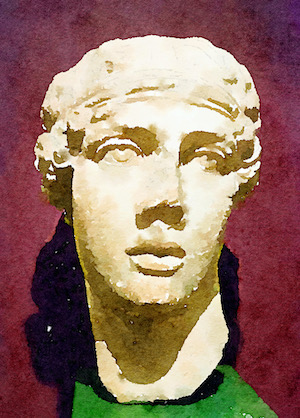
[Daughter] of Simon, though others [say] of Eumenos; others, of Eerigyos; others, of Ekrytos; others, of Semos; others, of Kamon; others, of Etarkhos; others, of Skamandronymos. Her mother was Kleis; [she was] a woman of Lesbos, from Eressos, a lyric poet, who was born in the 42nd Olympiad, when Alkaios also lived, and Stesikhoros, and Pittakos. She also had three brothers: Larikhos, Kharaxos, Eurygios. She was married to a most wealthy man, Kerkylas, who operated from Andros, and she had a daughter by him, who was named Kleis. There were three companions and friends of hers -- Atthis, Telesippa, Megara -- in respect of whom she incurred accusations of a shameful friendship/love. Her pupils were Anagora of Miletus, Gongyla of Kolophon and Euneika of Salamis. She wrote nine books of lyric poems. And she first discovered the plectrum. She also wrote epigrams and elegiacs and iambics and monodies. (Suda, sigma 107)
Born in Erebos on the island of Lesbos, Sappho (c. 630 – c. 570 BCE) was widely regarded as one of the ancient world's great lyric poets. Little is known of her early life, though she appears to have come from an influential family.
Around 600 BCE, Sappho and her family were exiled to Syracuse, possibly due to their involvement in political conflicts on Lesbos. The exiles were later allowed to return.
Sappho probably wrote around ten thousand lines of poetry, although only about six hundred and fifty survive. According to ancient authors, most of her output was lyric poetry, written to be sung and accompanied by a lyre. However, she is also credited with producing elegiac and iambic verse.
At some point, Alexandrian scholars produced at least one critical edition of Sappho's poetry. Aristophanes of Byzantium is known to have created one. Since contemporary sources have his pupil Aristarchus of Samothrace producing an edition of Alcaeus' work that replaced his mentor's, the same may have happened with Sappho's work.
The Alexandrian edition comprised at least eight books, with the poems possibly grouped by their metre and ordered alphabetically.
However, while her poetry was well-known, interpretations of her work have been coloured by conflicting accounts of her sexuality.
While it is generally accepted that she accumulated a circle of women and girls on Lesbos, the rest seems to be a mixture of myth, rumour, speculation and innuendo.
She is represented as exceptionally immoral in a variety of settings. The Suda has her married to Kerkylas of Andros. However, Kerkylas may be translated as a penis, while Andros could be read as a man. The union reputedly produced a daughter named Cleïs, which comes with various connotations, and the suggestion that the girl was one of Sappho's younger lovers rather than her daughter.
However, the Suda also note she was "slanderously accused" of sexual relationships with her "female pupils".
One tradition, which can be traced as far back as the poet and playwright Menander, suggests Sappho suicided by jumping off the Leucadian cliffs for the love of a ferryman named Phaon. However, Menander was a noted writer of Athenian comedy, a genre where Sappho was a popular character. Her name appears in the title of at least six separate comedies, where she seems to have been caricatured as promiscuous and heterosexual.
The earliest gay references seem to have emerged later.
Manuscript copies of her works may have survived into the Current Era, but by the 12th century, according to the Byzantine grammarian John Tzetzes "the passage of time has destroyed Sappho and her works".
That may have occurred because of the church's disapproval, though those notions appear to have emerged during the Renaissance,
On the other hand, the explanation may be relatively straightforward. Limited demand for Sappho's work may have meant it was not copied onto parchment codices as papyrus scrolls were superseded.
Alternatively, since she wrote in the relatively obscure Aeolic dialect, with many archaisms and innovations absent from other Greek dialects, readers possibly found Sappho's work difficult. The Roman author Apuleius specifically remarked on its "strangeness" in the 2nd century CE